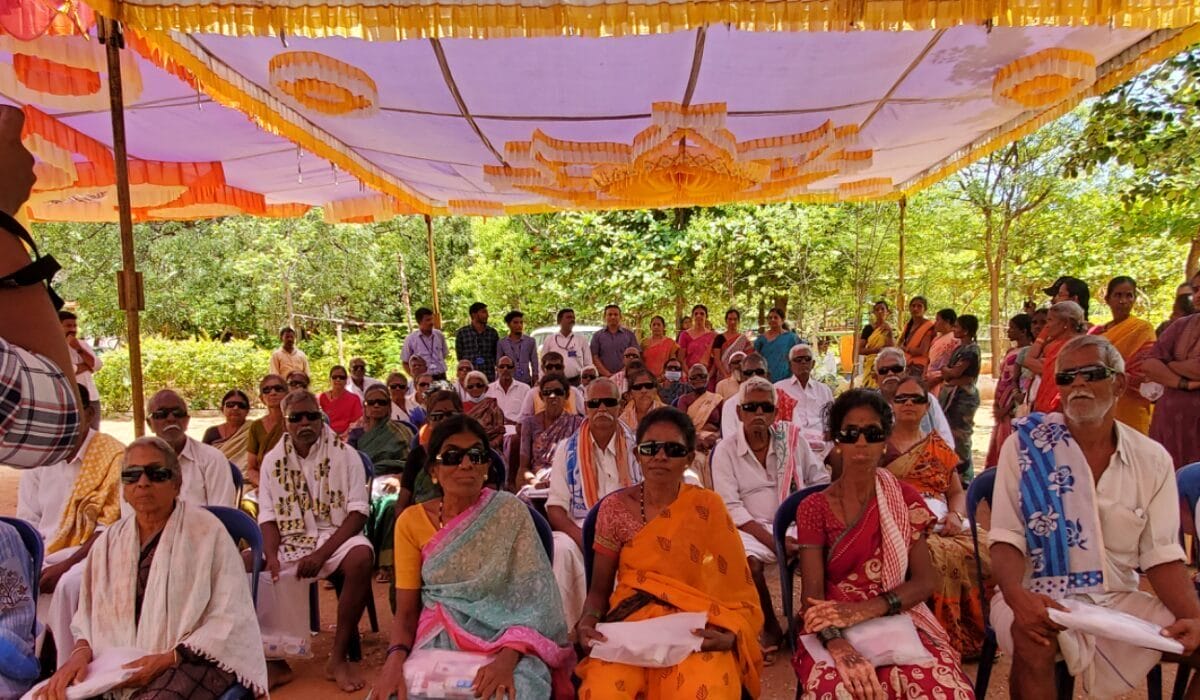Empowering Communities in India with Health and Education

Meet Daily Point of Light Award honoree Rishitha Maraka. Read her story, and nominate an outstanding volunteer or family as a Daily Point of Light.
Rishitha Maraka is changing lives through The Maraka Foundation, an initiative she founded to bring healthcare, education and essential resources to underserved communities in Southern India. With a passion for social impact, Rishitha has raised over $37,000 to fund medical camps, scholarships and infrastructure projects, making a tangible difference in the lives of thousands. Her commitment to health equity and education has led to the establishment of eye care centers, health awareness programs and essential school improvements for rural students.
One of Rishitha’s most impactful projects is the medical eye center initiative, which has provided free eye checkups, glasses and health education to nearly 11,000 villagers and students in Talamarla and surrounding communities. By partnering with organizations like Sankara Nethralaya, she has helped ensure that those who previously lacked access to vision care can now receive essential treatment. Beyond healthcare, The Maraka Foundation has also launched digital classrooms, provided scholarships and improved school facilities to support students’ educational journeys.
In addition to her work in healthcare and education, Rishitha’s foundation has also taken steps to support orphans, seniors and families in crisis. She has led menstrual hygiene drives, provided funding for clean water projects and donated sports equipment to schools. Her holistic approach ensures that entire communities, not just individuals, benefit from long-term sustainable development.
Read on to learn more about Rishitha’s leadership and what drives her to dedicate 30-40 hours per month to organizing donation drives, coordinating with local leaders and managing logistics for healthcare and education projects.

Tell us about your volunteer role.
Throughout my entire childhood, you’d find me every weekend at my local soup kitchen, food bank, pet shelter and beyond. Volunteering was something I’d bring my family and friends into every second I had the chance to because I was able to grow my personal relationships while bettering the surrounding community I grew so close with.
My volunteering experiences over the past few years blossomed even further as I channeled my efforts towards a larger scale of impact—I now, at the age of 17, serve as the founder and director of The Maraka Foundation, an organization dedicated to promoting health resources, education and community development in rural India.
My role involves planning and managing initiatives such as merit and need-based scholarships, hosting medical awareness camps, supporting rural families with access to healthcare and partnering with local organizations to build sustainable infrastructure like libraries, digital classrooms and irrigation systems. I also lead fundraising efforts, which have raised over $39,000 to date, and work directly with the communities we serve to ensure our projects address their needs.
Why are these issues so important to you?
Growing up, I witnessed firsthand the extreme inequalities in access to education and healthcare in rural parts of India, especially in my father’s hometown village. Neighboring families often couldn’t afford basic necessities, let alone adequate medical care or resources to support their children’s education. I also saw how a lack of opportunity in rural areas forced young people to leave their hometowns for work, which affected both families and communities. I wanted to change that reality by creating opportunities where they live so that no one is left behind due to where they were born.
What inspired you to start a nonprofit?
During visits to my hometown in India, my brother and I were deeply affected by the level of poverty and the struggles of families, including our own, who were unable to access healthcare and education. We spoke with children our own ages who couldn’t attend school because their families needed them to work, and I heard stories of seniors unable to afford necessary medical treatment. It became clear to us that we couldn’t just stand by—we wanted to do something to create lasting change. That’s when we founded The Maraka Foundation, together. What started as a small effort has since grown into a community-supported organization making a tangible impact.
What are your long-term plans or goals for the organization?
Our long-term goal is to create self-sustaining communities where access to healthcare, education and clean resources is no longer a barrier to opportunity. We aim to expand our health initiatives by establishing primary healthcare centers, organizing regular hygiene product drives and ensuring access to preventive care resources.
Additionally, we plan to build more digital infrastructure in rural schools and create vocational and technical training programs to empower students to secure jobs in urban areas without having to leave their communities. Ultimately, we want to ensure that every person in these communities has access to dignified healthcare and support systems.
What’s been the most rewarding part of your work?
The most rewarding part is seeing how our efforts change lives. For example, providing scholarships to rural students not only gives them access to better education but also opens doors to opportunities they never imagined possible. Hearing families express their relief after receiving prescription glasses through an eyecare camp we hosted, that would have otherwise been unaffordable, reminds me why I started. These moments, where I see lives genuinely transformed through community collaboration, give me the motivation to continue working toward long-term equity.
Why is it important for others to get involved with causes they care about?
We each have a unique perspective on the world and the ability to create change. If we wait for someone else to solve the issues we see around us, they might never get solved. When people work toward a cause they are passionate about, not only do they make a difference for others, but they also become more connected to their communities and develop a greater sense of purpose. Small actions can create a ripple effect, and the more people who get involved, the greater the impact we can have on solving large-scale issues like healthcare inequities and poverty.
Any advice for people who want to start volunteering?
Start small and find an issue that truly resonates with you. Volunteering doesn’t require grand gestures. It can be as simple as lending your time to a local organization or offering your skills to a cause. Be willing to learn from the people you serve and build relationships in the community. Stay patient. change takes time and persistence, but your efforts will eventually add up. Most importantly, remember that success isn’t measured solely by numbers or milestones. It’s about the lives you’ve touched and the trust you’ve built with those you are trying to help.
What do you want people to learn from your story?
I want people to understand that change starts with empathy and courage, and anyone can make a difference in the world if they are willing to act on what they believe in. You don’t have to wait for the “perfect time” or ideal conditions to begin—start with the resources you have and learn as you go. My hope is that my journey with The Maraka Foundation inspires others to identify problems in their communities and work toward solutions that promote opportunity, and equity for all.
Do you want to make a difference in your community like Rishitha? Find local volunteer opportunities.
